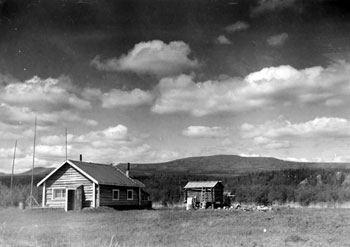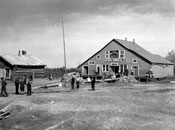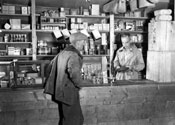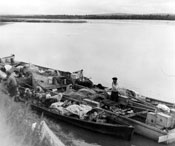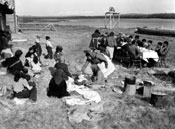        |  |
                 | |
|
Old Crow
|
||||||||||||
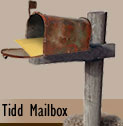 |
|||||||||||||
 |
|||||||||||||
|
Old Crow
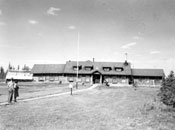
Mary and Claude pause to contemplate Mary’s former place of employment, the Hudson Stuck Memorial Hospital.
Yukon Archives: #91/112 #549, PHO 606
After a six-day motorboat trip upriver from Fort Yukon, the Tidds arrived in Old Crow in September 1944 to take over the running of the Northern Commercial Company store there. It was the sort of remote and intimate community they thrived in. “Almost the whole population of our little isolated settlement is Indian,” Claude wrote in the 1944 Christmas letter. “In addition, we have a married Corporal of the R.C.M. Police [sic] and his wife [the Kirks], and one man working with him; also a young married Missionary and his wife [the Ellis’]. There are also two or three other white men living here.”
The Tidds found that their initial accommodations left a lot to be desired:
My predecessor, who had owned the store for many years, was an old bachelor who had lived in the rear end of the log store building, a small room about fifteen feet by ten feet wide, the entire furnishings being an ancient wood-burning cook-stove; an equally ancient heating-stove; a kitchen table and a wash basin. Into this we had to move with what personal belongings we had been able to bring with us, and manage our domestic arrangement as best would could. (“A Year with a Fur Trader”, in Life in the Yukon, 54)
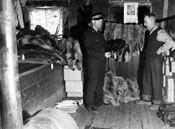
“Our fur is checked and examined by the R.C.M. Police in the Store.” 1946. The RCMP enforced game regulations in the Yukon.
Yukon Archives: #8234
Fortunately I was able to secure a small three-roomed log cabin near the store with the cheerful and able assistance of our young missionary who was an excellent amateur carpenter, and the Mounted Police corporal who very efficiently superintended the installation of a radio set, we were able to move into fairly comfortable quarters by the first week in November when it really began to get cold. (“A Year with a Fur Trader”, in Life in the Yukon, 54)
“We are very isolated up here; our last boat containing our supplies for the next eight months arrived about the end of September, and we do not expect to have another boat until June. We hope though to have the luxury of perhaps two or maybe three mails by air during the winter months. However, we are fortunate in that we do have radio communications every day with Dawson – our Police Corporal being the Operator. We do, of course have a good radio set and usually get excellent reception.” (Christmas letter, 1944. 91/112 f. 7 MSS 365)
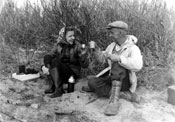
“We have a picnic lunch at Old Crow on my birthday, May 21 1945 – incidentally this was the day the ice ‘went out’ on the Porcupine River.”
Yukon Archives: #8198
It is possible that Mary had not yet become close enough to her neighbours to be a full party to all of their worries. Her assessment of their moods may have also said something about hers, now that Claude was employed and they were settled in a peacefully remote village again. However, in the Christmas letter from the next year, she again reveals her love of the neighbours, heightened by the collective joy over V.E. Day.:
Since then life here, with its key-note of happiness goes on as before. It seems almost as though some implicit faith in ultimate good is the guiding star, for despite the war clouds, these people lived happily…
I find myself taking courage from them—from their simplicity. Actually they have so little! – there is the everlasting struggle in such a cold climate, for the absolute necessities of life – but they always manage somehow. (Christmas letter, 1945. 91/112 f. 7 MSS 365)
Claude’s contribution to the letter is a marvelously informative encapsulation of the community life they have witnessed and shared.
We have now been through a whole round of one year’s activities here; we have seen our boat load of supplies coming in and have got lots of kick out of some of our new things – just as the natives do. We have seen our boats beached in the Fall before the river freezes up. The natives going on their caribou-hunt, coming home with plenty of fresh meat which is a very important feature as we have no butcher here and depend almost entirely on caribou meat. Then in winter we have seen men (and women) go out to their trap-lines with their dog-teams. (Christmas letter, 1944. 91/112 f. 7 MSS 365)
Christmas brought its round of festivities, its dances by the natives – always very picturesque – and ‘potlatches’. Later on, in the spring they were off again and out to the musk-rat trapping-grounds. This literally is their harvest and everybody, except the very old and sick leaves with high hopes of a good catch. It is an interesting sight to watch them leave too. Out by dog-team; in a month or so back again in boats made of canvas. Then the resulting rush and bustle of counting and packing skins; the natives’ pleasure in getting new things and of course the inevitable ‘fresh oranges, apples and eggs’. (Christmas letter, 1944. 91/112 f. 7 MSS 365)
|
|||||||||||||
| “Whaddo I do with myself” |  |
